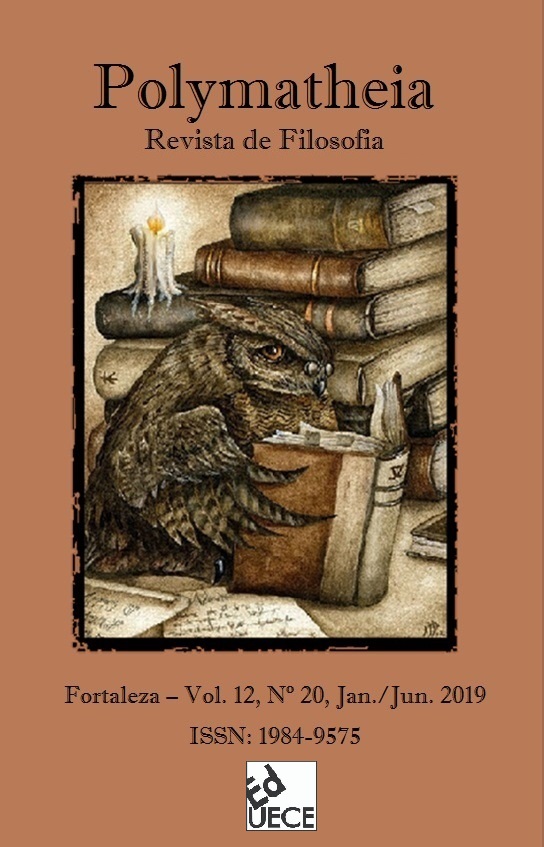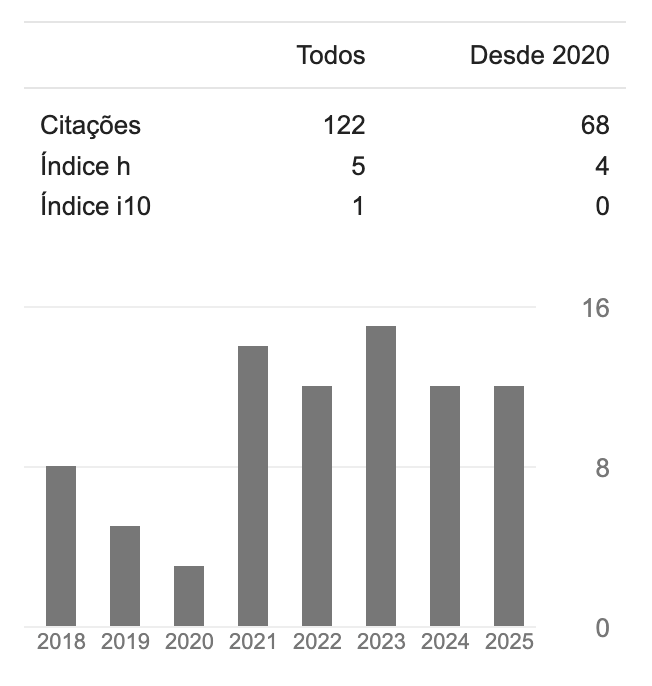FUNÇÃO PRÓPRIA, PARTES DA ALMA E VIRTUDE MORAL NA ÉTICA PLATÔNICA
Schlagworte:
Platão, República, Alma, Função Própria, VirtudeAbstract
O presente artigo pretende recolher os dados fundamentais, presentes no diálogo platônico A República, relativos às funções, objetos e partes da alma na teoria platônica da alma tripartite. A centralidade da chamada Teoria da Função Própria é o fator determinante para tal empresa, primeiramente, por ser o critério de delimitação de cada parte, segundo porque diz o que é uma parte da alma para Platão; e, por fim, porque é o principio que determina o que é uma virtude e um vício. Cada parte da alma
é uma parte da alma por cumprir uma função de acordo com sua natureza e ao desempenha bem ou mal, a alma é virtuosa ou viciosa. Desta forma, a função própria da alma racional bem executada é a sabedoria, a da parte irascível é a coragem e a temperança é relativa à obediência do elemento apetitivo às designações racionais.
Downloads
Literaturhinweise
ADAM, J., ed. [1902]. The Republic of Plato. 2 vols., Cambridge.
ANNAS, J., An introduction to Plato's Republic. Oxford: Clarendon, 1991.
BOERI, M. “¿Por qué el thymós es un “aliado” de la razón en la batalla contra los
apetitos irracionales? La explicación de Platón para acercar la cólera a lo racional y no a
lo apetitivo”. Versão apresentada no IV Taller Latinoamericano de Filosofía Antigua
(República IV, 436a- 440c) em Junho de 2009.
BURNYAT, M.F., The Truth of Tripatition. Proceedings of the Aristotelian Society 106
(1): 1-23 (2006).
BÜTTNER, Stefan. The Tripartition of the Soul in Plato’s Republic. In News Essays on
Plato: Language and Thought in Fourth-Century Greek Philosophy. Editor Fritz-
Gregor Herrmann. The Classical Press of Wales, 2006.
COOPER, John M., Plato’s Theory of Human Motivation. In History of Philosophy
Quarterly, Vol I, No 1, 1984.
CORNFORD, F. M., Psychology and Social Structure in the Republic of Plato. The
Classical Quartely, Vol. 6, No. 4, out., 1912.
DELCOMMINETTE, Sylvain. Facultés et Parties de l’Âme chez Platon. In The
Eletronic Journal Of the International Plato Society, No 8, 2008.
DIXSAUT, Monique. Le Plus Juste est le Plus Heureux. In Études sur la République de
Platon, sur la direction Monique Dixsaut. Paris: Vrin, 2005.
_____, Platon et la Question de la Pensée. Etudes Platoniciennes I, Paris, Vrin, 2000.
IGLÉSIAS, Maura. Platão: A descoberta da Alma. In Boletim do CPA, Campinas, No
/6, 1998.
IRWIN, T., Plato's ethics. New York; Oxford: Oxford Univ., 1995.
KRAUT, Richard. Desire and the Human Good, in Proceedings and Adresses of the
American Philosophical Association, vol. 68, No. 2 (Nov., 1994).
LORENZ (2006), The Brute Within: Apetitive Desire in Plato and Aristotle. NY:
Clarendon Press Oxford.
MOLINE, J., Plato on the Complexity of the Psyche. Archiv Für Geschiche der
Philosophie, 60, 1978, 1-26.
PRICE, A.W., Mental Conflict. Routledge: London and New York.
PROCLO. Commentaire Sur la République. Trad. Fr. A. J. Festugière. Vrin, 1970
OCHOA, C. G., La Música del Universo: apuntes sobre la noción de armonía em
Platón, México, 1994.
PENNER, Terry. "Thought and Desire in Plato." In Gregory Vlastos, ed., Plato: A
Collection of Critical Essays, II: Ethics, Politics, and Philosophy of Art and Religion.
Modern Studies in Philosophy. Garden City, New York: DoublEday, Anchor Books,
RENAUT, Olivier. Le Rôle de la Partie Intermédiaire (thumós) dans la Tripartition de
l’Âme. In The Eletronic Journal Of the International Plato Society, No 6, 2006.
SMITH, N. D., Plato's Analogy of Soul and State. In Essays on Plato's Psychology,
editado por Ellen Wagner, 2001.
THAYER, H. S. (1964). Plato: The Theory and Language of Function. In The
Philosophical Quarterly, Vol. 14, No. 57.
WILLIAMS, B., The Analogy of City and Soul in Plato's Republic.In Essays on Plato's
Psychology, editado por Ellen Wagner, 2001.
ZINGANO, M. A. A. L'argomento della funzione nella Reppublica di Platone. In:
Casertano, Giovanni; Cornelli, Gabriele. (Org.). Pensare la città antica: categorie e
rappresentazioni. 1 ed. Nápoles: Lofredo Editores SA, 2010, v., p. 121-135.
_____, Ethica Nicomachea I 13 – III 8: Tratado da Virtude Moral. Tradução, notas e
comentários por Marco Zingano. São Paulo: Odysseus Editora, 2008.











